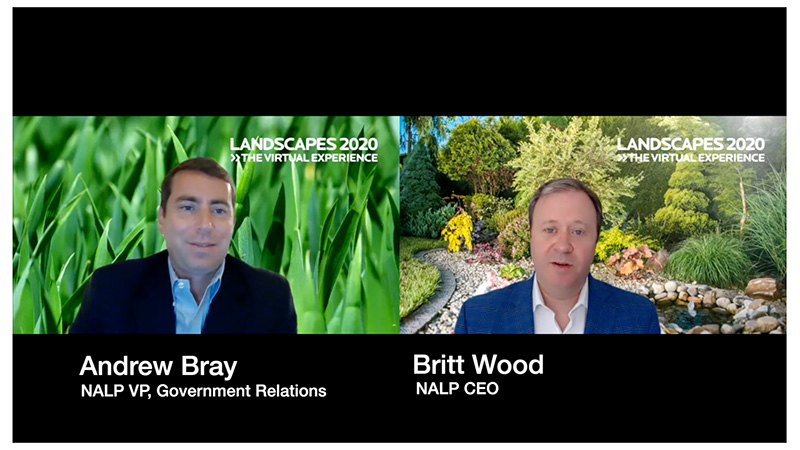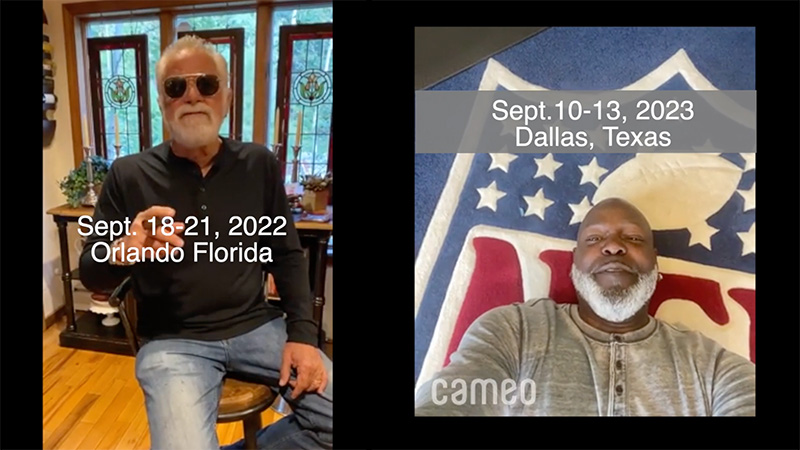
The National Association of Landscape Professionals (NALP) had a little help from some friends as the organization’s Landscapes 2020 virtual event kicked off.
“I know most of us would rather be in Louisville, gathered together right now, but COVID-19 made it so that was not possible,” said Britt Wood, NALP CEO. “What we made possible is the opportunity to learn and improve your business.”
NALP hosted more than 40 educational sessions virtually, and, as an added benefit, the sessions are available on-demand after the conclusion. NALP also hosted happy hours and a virtual version of the popular Breakfast with Champions.
As the virtual event kicked off, outgoing President of NALP’s board of directors Andrew Ziehler, president of Ziehler Lawn & Tree Care, said 2020 has been an experience of a lifetime.
“It was long at times; it was short at times,” he said. “I think we were making decisions 30 minutes at a time for a while.”
Ziehler tipped his hat to NALP for helping guide landscape and lawn care professionals through a challenging spring, with NALP’s government affairs team advocating for the industry
“That really gave us the strength to keep businesses open,” he said.
Next year, 2021, will be the final year for Landscapes in Louisville. Ziehler said he looks forward to NALP’s annual conventions in 2022 and 2023.
“Our new annual meeting is going to be the launching pad or the rebirth of NALP and the magic that we have had as an association,” he said.
To help announce the locations of the 2022 and 2023 annual meetings, NALP brought some special guests — the Most Interesting Man in the World and NFL Hall of Famer Emmitt Smith.
NALP’s annual meetings will be Sept. 18-21, 2022, at the Gaylord Palms Resort and Conference Center, Orlando, Fla., and Sept. 10-13, 2023 at the Gaylord Texan Resort and Conference Center, Dallas, Texas.

Governmental affairs update
Following up on NALP’s virtual Landscapes kickoff, Andrew Bray, vice president of government relations for NALP, joined Wood for an update on COVID-19, H-2B and more.
Bray said if anything 2020 showed how critical the organization’s advocacy is as members and state associations took to statehouses to get landscaping deemed an essential task in all 50 states.
“When you look back at COVID-19 and the landscape industry, it’s been tough on all of us, but I think we had more wins than losses specifically in how we handled it from a government relations standpoint,” he said. “Our members had boots on the ground. I really want to thank the industry as a whole for working with us. It was a lot of teamwork.”
Bray said while the H-2B program is suspended through the end of the year, the Department of Labor has not suspended processing the applications and processing the certifications demonstrating need. Bray said those interested in applying for 2021 H-2B guest workers should continue doing so.
Bray also updated attendees about pesticide issues that may come to the forefront of 2021.
“A bill was drafted at the federal level that would drastically gut the Federal Insecticide, Fungicide, and Rodenticide Act (FIFRA),” he said. “It would reimagine the entire way the pesticide process is done and it would roll back preemption. It would embrace the cautionary principle of the EU and several other onerous provisions.”
Congress will revisit this bill when it the next Congress convenes. NALP said it’s important that members defend the industry’s responsible use of pesticides.
“This really is a call to action for our lawn care members,” Wood shared. “This is the time where we are going to need you to be actively working with your local and state jurisdictions.”
Employees at the center
Paul Fraynd, CEO and partner, Sun Valley Landscaping, and Seth Kehne, president of Lawn Butler, explained how they’re each creating an employee-centric culture at their companies.
They cited Gallup’s State of the Global Workforce study that said engaged workforces are more productive, make 21 percent more profit and grow four times faster than nonengaged companies.
Fraynd and Kehne shared some of the tougher times in their businesses that led them to make changes and train and empower their employees. “The main thing we want you to take away from this is that leadership is a responsibility, not a privilege,” Fraynd said.
They laid out the elements of building a better employee culture, including purpose, values, fun, genuine care, communication, transparency, trust and accountability, growth and recognition, training, safety and maximizing employee value.
Right thing for the environment
In a session on sustainable landscapes, Bob Grover of Pacific Landscape Management described how landscape companies can be more environmentally friendly.
Grover defined sustainable landscape management as low-impact, low-maintenance and low-resource practices that are adapted to a particular site and its climate. He said that while no company can be 100 percent sustainable, companies can be more ecologically friendly by recycling, using low-emission equipment, incorporating bioswales, using solar panels, installing xeric landscapes and using goats as a weed control method.
“There’s been a great focus the last couple of decades on saving the Earth. Some of the things we do put a bullseye on our chest,” said Grover, naming wasting water, spraying chemicals and emitting air pollution. “Find a balance between (doing) the right thing for the environment and having it be affordable and acceptable.”
